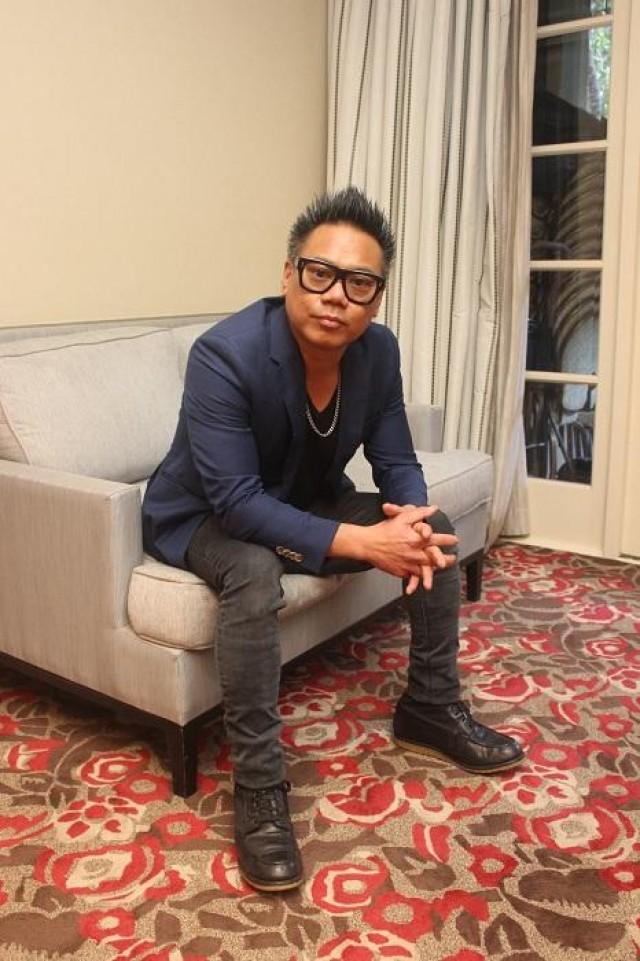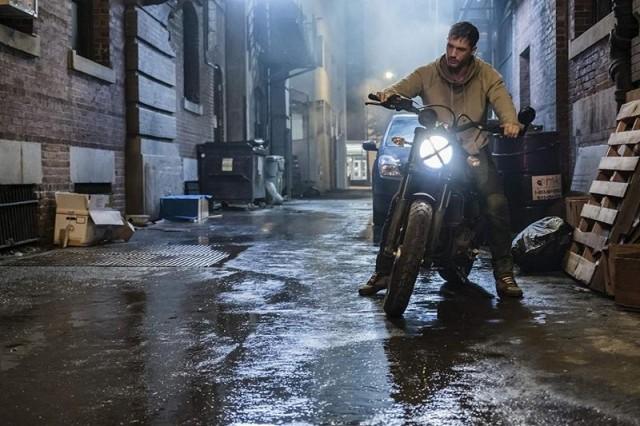Pinoy cinematographer Matthew Libatique behind 'A Star is Born' is also behind 'Venom'
Los Angeles — Award-winning cinematographer Matthew Libatique, most recently of 'A Star is Born' fame, talked to us recently about his work on the Ruben Fleischer-helmed superhero film “Venom.”
Starring Tom Hardy as Eddie Brock/Venom alongside Michelle Williams as Anne Weying, Riz Ahmed as Carlton Drake/Riot, Scott Haze as Roland Treece and Reid Scott as Dr. Dan Lewis, the movie is based on the Marvel Comics character of the same name.
Below are excerpts of our conversation with the 50-year-old talented cinematographer from Queens, New York:

It's your first time to work with director Ruben Fleischer. So how was that experience for you?
It wasn't the first time, actually. Ruben and I had talked a long time ago about making "Gangster Squad" together. That's how I met him.
We had a meeting and he was in the process of hiring a cinematographer or looking for [one] to talk about "Gangster Squad."
We got along in our meeting and I found him to be a really, you know, he's younger than I am. So he had an enthusiasm as a filmmaker, the honest enthusiasm, he loves films and luckily we had an opportunity to work together on sort of a kind of a long form commercial. So, at least, there was some back a backstory there.
And when I got a call from my agent about "Venom," I had missed the superhero genre in my career — it had been a long time since "Iron Man' and "Iron Man 2," or even "Cowboys and Aliens." I missed it, you know, it's always the grass is always greener, you know, you do something like that and then you want to do something smaller and then you do a few smaller things and you want something bigger.
And I've been fortunate but it's also something that I've actively tried to do. [And there was ] the added value of the director being somebody I've worked with before. So there was still that learning.
Where I really I wanted to do is when one of his references was John Carpenter's "The Thing" and "Big Trouble in Little China." And I was like, okay, that's inspiration for me in a way that I haven't had yet in my career. So I was intrigued by that.
And so, you know, he was saying all the right things. And to be quite honest, the real reason I wanted to do the film besides wanting to get back into the genre and being intrigued about John Carpenter and this reference of a film that harkened back to a simpler kind of sci-fi horror.

I really wanted to work with Tom Hardy, and as you see in the movie, his performance is extremely unique. And we had watched "All of Me," which is with Steve Martin and Lily Tomlin — It's about a man acting physically about being possessed internally — I'm saying, well, how's this going to work with Tom Hardy?
And then, you know, he reinterpreted that notion. The struggle really is that a large film is bound by a lot of opinion when you're making it.
So with "A Star is Born" I had this focused like tandem of Bradley Cooper and I'm making the movie with the camera and the actors and everybody else as well, but there was a very intimate sort of a environment.
This one was the polar opposite. This is like everybody has an opinion and as the director, Rubin's, you know, his great achievement really is how he's allowed people to come in and collaborate.
But it's difficult for him to manage. I remember from my past experiences on "Iron Man" and "Iron Man 2" but it's a different animal that you have to wrangle in. But because I have experience in smaller films and I had just done "A Star is Born" I never really lost sight of the fact that the camera, no matter what I do, I just have to focus on Tom and I think that's where we're in in sync.
Would you say you went wild with "Venom" and you went more naturalistic with "A Star is Born?"
I don't think I went wild. Like I said, there's so many opinions, there's storyboards, there's visual effects. In these movie, you don't really go wild. It's like everything has to be. There's very little improvisation. You really have to be kind of communicative before you even get there in terms of shooting because so many people have to sign-off on what you're doing. So it's not the freest environment to create.
But I kept thinking John Carpenter. And I think that the most important thing for a comic book movie is you have to respect its base audience. So in the back of my mind, I'm not responsible for a screenplay. I'm not responsible for performance, but I am responsible for the atmosphere. And that atmosphere was sort of my key focus.
I've heard criticism about the movie, about how it doesn't coincide with the current universes of DC or Marvel or whatever. A review said that it looked like it was lifted out of the early two thousands. Well, I don't think that's negative.
I think it's positive that it feels like something else. It should stand out. Why should we be bound by what's out there now? It should be something else. I guess in that respect it's not going wild, but for me it was like we just have to set ourselves apart from. It's an origin story number one. So it was like that's the most freeing thing.
That's as free as you could possibly get in a superhero movie is to do the origin story. So visually, I just had it in my mind that I really didn't care what other movies look like when we made it. So in that sense, I guess maybe it was freeing.
And why work with Tom Hardy?
He's just watchable. There is just something about him. I had never met him before. The first film I ever saw him in was Nicolas Refn's "Bronson." Then I couldn't stop watching him in "Inception" or in "The Dark Knight Rises" or "Peaky Blinders."
He's always doing something so multilayered and this was a chance here to do something really special. The final takeaway from the movie, for me, is I got to watch one of our great actors create a character and define one. In the same way Robert Downey, Jr. defined Tony Stark, I think Tom Hardy defined Eddie Brock.
DOP genius Matty Libatique ??????????????????????????????????
A post shared by Tom Hardy (@tomhardy) on
It took a while for them to get Ruben Fleischer. I've heard you decide to take on a project depending on who is directing it. Is that true?
Well, what I think that the textbook was, is that you want to do it by the script. And of course the filmmaker that you're working with.
So yes, but like I said earlier, some films you do for different reasons in the grand scope of things. I had just missed the genre.
I had missed the scale, I had missed the challenge of it so I just wanted to get back into it. So that was my main motivation, in secondary. I mean I really wanted to see this particular actor work. Rubin gave me the inspiration of John Carpenter and we tried to lean into that as much as possible.
But, similarly to Jon Favreau, Ruben said, "I just want to make a movie that people enjoy watching." So when I read reviews and they're killing the film for whatever reason, I think about how many people have seen it and how the film did in its first weekend, I know there's lots of people watch and enjoy it and that was his goal, and I think we achieved that.
Who knows what its sustainability is, but people enjoyed the movie and it's a very quick one and it's just a wild ride from beginning to end. To me it's a success.
Would you describe yourself as a cerebral cinematographer?
Yeah, I think I do. I try to be as thoughtful as possible. There's a lot of technique that goes into cinematography and I try not to deviate from the storytelling when I apply technique.
It’s something I learned very early on with Darren Aronofsky at AFI, where we put the camera, how we move the camera, what I do in the light. I mean with everything a choice has to be made attached to something and it can be global, like the whole atmosphere of a story like "Venom" or it could be structural like in "Requiem for a Dream" color changes based on season.
I don't really want my aesthetic to be in the movie. Like you don't impose your will. What I like to do is just offer my opinion and then if that turns into aesthetic, that aesthetic belongs to the movie, not to me.
Do you still advise potential cinematographers not to buy a camera but to just rent it?
I used to feel that way. When I first started, people used to own 16 millimeter cameras and when I was young there weren't as many cinematographers. When you're a young cinematographer trying to make it, it's always difficult, and people own 16 millimeter cameras, but then they started to be bound by that equipment and then after a while you, if you have this expensive equipment, then you have to pay for that and specify equipment and then you end up using the same equipment.
So what ends up happening? Your stuff starts looking the same. These days, because it's affordable now to have a digital camera, I don't feel that way anymore. I think that cinematographers could have their own cameras, but be careful of using the same lenses. With every film, there's an interpretation for that movie that's customized. It's like if you only have this set of lenses and you only own this camera, then I think you've closed the door to so many other choices. So I think that as long as you're not going broke owning one, go ahead.
So what's next for you?
I'm in preparation on a film currently called "Birds of Prey." It's probably going to have a different title. It’s with Warner Brothers, and the director is Cathy Yen. Who directed a film called "Dead Pigs" which is a Chinese film. I'm excited. It's, in the superheroes genre but this time it's in the DC universe, not the Marvel universe. Margot Robbie is set to star and I'm excited for that. And then it has a little bit of origin story in it, so it makes it intriguing and it's very early though, so early discussions. — LA, GMA News




